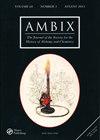Living Then and Now with Gold and Mercury.
IF 0.6
3区 哲学
Q3 HISTORY & PHILOSOPHY OF SCIENCE
引用次数: 1
Abstract
250 Water Street in New York City marks the location of a former 48,000-squarefoot parking lot in Lower Manhattan currently under construction by the Howard Hughes Corporation, a Texas real estate development agency. Since its purchase in 2018, however, the Howard Hughes Corporation’s massive redevelopment scheme for this lot has experienced continuous setbacks. One problem stems from the construction zone itself. It encompasses the site of the thermometer factory that Giuseppe Tagliabue (1812–1878), an Italian-born, London-trained scientific instrument maker established in 1834. Tagliabue’s first place of business was 240 Water Street. By 1848, he had relocated to nearby 298 Pearl Street where he continued to manufacture thermometers, barometers, and hydrometers on a large scale, and in 1868 Tagliabue purchased and “fitted up” a five-story building at 302 Pearl Street. These addresses lie within a quarter mile of each other. Not only is the ground beneath the Howard Hughes Corporation’s construction site contaminated with mercury, but mercury pollutes the ground beneath and the air above the surrounding neighbourhood as well.生活在过去和现在与黄金和水星。
本文章由计算机程序翻译,如有差异,请以英文原文为准。
求助全文
约1分钟内获得全文
求助全文
来源期刊

Ambix
HISTORY & PHILOSOPHY OF SCIENCE-
CiteScore
0.80
自引率
60.00%
发文量
42
审稿时长
3 months
期刊介绍:
Ambix is an internationally recognised, peer-reviewed quarterly journal devoted to publishing high-quality, original research and book reviews in the intellectual, social and cultural history of alchemy and chemistry. It publishes studies, discussions, and primary sources relevant to the historical experience of all areas related to alchemy and chemistry covering all periods (ancient to modern) and geographical regions. Ambix publishes individual papers, focused thematic sections and larger special issues (either single or double and usually guest-edited). Topics covered by Ambix include, but are not limited to, interactions between alchemy and chemistry and other disciplines; chemical medicine and pharmacy; molecular sciences; practices allied to material, instrumental, institutional and visual cultures; environmental chemistry; the chemical industry; the appearance of alchemy and chemistry within popular culture; biographical and historiographical studies; and the study of issues related to gender, race, and colonial experience within the context of chemistry.
 求助内容:
求助内容: 应助结果提醒方式:
应助结果提醒方式:


